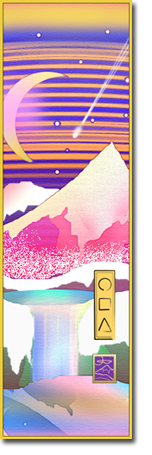On The Way: The Daily Zen Journal
Stop Opinions
Foyan (1067-1120)
The Third Patriarch of Zen said, “Don’t seek reality, just put a stop to opinions.” He also said, “As soon as there are judgments of right and wrong, the mind is lost in a flurry.” These sayings teach you people of today what to work on.
When you read his saying, “Don’t seek reality,” you say there is no further need to seek—this means you are still entertaining opinions and are in a flurry of judgments; after all, you have not reached a state of mind where there is no seeking, and are just making up an opinionated interpretation.
People who study Zen nowadays are all like this; reading a transformative saying and reaching an insight into the words, they then try to apply it to all sayings, thinking they are all the same.
Keeping this in their hearts, they think of it as their own attainment; far from realizing they have lost their minds by entertaining an opinionated understanding, they cling to it and will not let go. What ignoramuses!
Would you like to attain a state of mind where you seek nothing? Just do not conceive all sorts of opinions and views. This non-seeking does not mean blanking out and ignoring everything. In everyday life twenty-four hours a day, when there is unclarity in the immediate situation, it is generally because the opinionated mind is grasping and rejecting. How can you get to know the nondiscriminatory mind then?
Thus when an ancient sage was asked if the created and the uncreated are different, he said they are not. Sky and earth, rivers and seas, wind and clouds, grasses and trees, birds and beasts, people and all living things living and dying, changing right before our eyes, are all called created forms. The uncreated way is silent and unmoving; the indescribable and unnameable is called uncreated. How can there be no difference?
Grand Master Yongjia said, “The true nature of ignorance is the very nature of enlightenment; the empty body of illusions and projections is the very body of realities.” These two are each distinct; how do you understand the logic of identity? You have to experience the mind without seeking; then they will integrate, and you will get to be trouble-free.

In the ten stages of enlightenment, the fifth is the stage Difficult to Conquer, which means that it is extremely difficult to attain equality of real knowledge and conventional knowledge; when you enter this stage, the two are equal, so it is called the state that is difficult to conquer. Students of the path should take them in and make them equal twenty-four hours a day.
And do you know they are drawn up by your nondiscriminatory mind? Like an artist drawing all sorts of pictures, both pretty and ugly, the mind depicts forms, feelings, perceptions, abstract patterns, and consciousnesses; it depicts human societies and paradises. When it is drawing these pictures, it does not borrow the power of another; there is no discrimination between the artist and the artwork. It is because of not realizing this that you conceive various opinions, having views of yourself and views of other people, creating your own fair and foul.
So it is said, “An artist draws a picture of hell, with countless sorts of hideous forms. On setting aside the brush to look it over, it’s bone-chilling, really hair-raising.” But if you know it’s a picture, what is there to fear?
In olden times, when people had clearly realized this, it became evident in all situations. Once when the great teacher Xuansha was cutting down a tree a tiger bounded out of the woods. The teacher’s companion said, “It’s a tiger!” The teacher scolded him and said, “It’s a tiger for you.”
Another time, when he saw a seeker performing prostrations, Xuansha said, “It is because of the self that one can bow to the other.” These expedients are in profound accord with the intent of Buddha.
The great teacher Fayan once pointed to a dog right in front of him and said, “An engraving.” When you look at this, do not look to the dog itself for clarification; you must see it in your own experience before you can get it. Only then will you understand the saying, “As soon as there are judgments of right and wrong, you lose your mind in a flurry.” I hope you get the point!
Foyan (1067-1120)
Source Instant Zen – Waking up in the Present, trans by Thomas Cleary





“….eventually it will sink in thoroughly, and then you will understand.”
OK, wiping dust off hands, that about covers it! Just kidding, but I do so enjoy this line. It touches on faith in the Way, something almost indescribable and, just where does it arise from?
After all the confusion, mistakes, and ironies in life, we nestle back into our faith in the Way. Not the kind of traditional use of the word faith, more of an inner assurance that all is well on some fundamental level.
With any spiritual discussion, there is always a point where you just can’t understand, because the very faculty of trying to grasp it all is standing in the way. So what do you do at that point? Relax, sit back, and know that it is there for you somehow.
There is another distinction I want to clarify. It is easy to nod our heads and agree with Foyan’s comment… People who study Zen nowadays are all like this; reading a transformative saying and reaching an insight into the words, then they try to apply it to all sayings, thinking they are all the same…
There is superficiality everywhere, and spiritual pursuits are certainly not immune to the above, confused mentality. However, there can be an elevated use of spiritual stories or phrases that can serve as reminders. They don’t certify any attainment on our part, far from it, but they do serve to remind us and bring us back to our center.
And they aren’t mechanical but are helpful in times of confusion or attachment. I can think right now of several that come to my own rescue from time to time. They are teaching tools, and expedients, that can help us break through.
So, employing Independence as discussed above, it is beneficial to be able to step back and use our own light of discernment in learning from our teachers. Even they can have blind spots…
Genuinely yours,
Elana, Scribe for Daily Zen